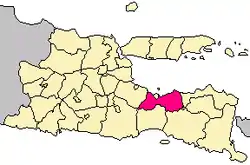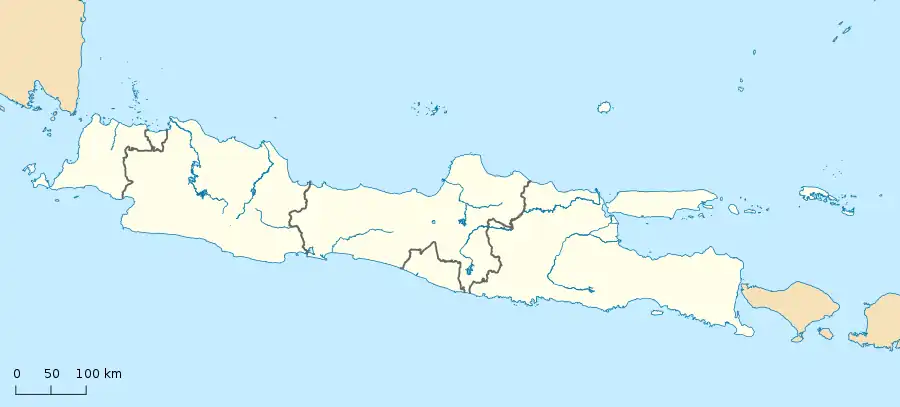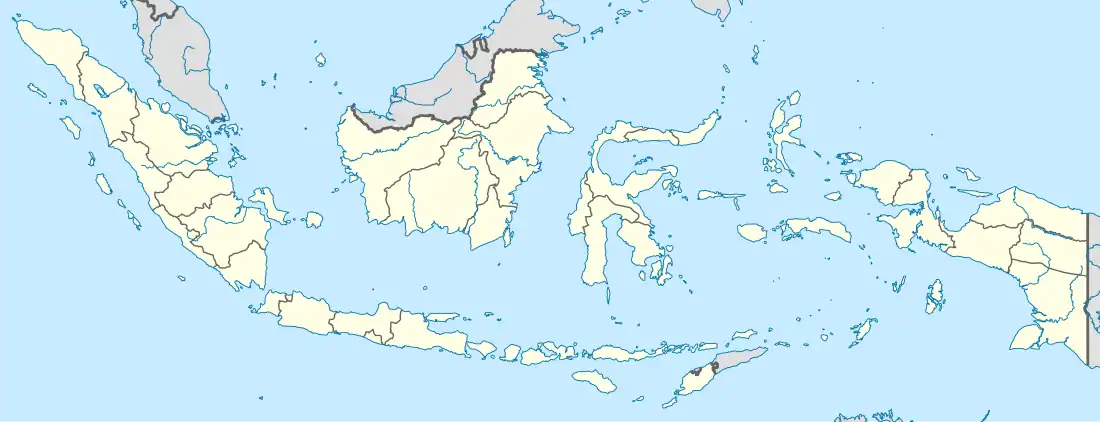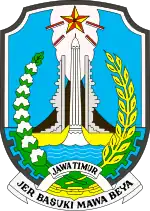Probolinggo Regency | |
|---|---|
.jpg.webp) Ngadas | |
 Coat of arms | |
| Motto(s): Prasaja Ngesti Wibawa (By modesty for the sake of dignity) | |
 Location within East Java | |
| Coordinates: 7°44′07″S 113°28′18″E / 7.73528°S 113.47167°E | |
| Country | Indonesia |
| Province | East Java |
| Anniversary | 18 April 1746 |
| Capital | Kraksaan |
| Government | |
| • Regent | Puput Tantriana Sari |
| • Vice Regent | Timbul Prihanjoko |
| Area | |
| • Total | 1,696.17 km2 (654.89 sq mi) |
| Population (mid 2022 estimate) | |
| • Total | 1,159,965 |
| • Density | 680/km2 (1,800/sq mi) |
| Time zone | UTC+7 (IWST) |
| Area code | (+62) 335 |
| Website | probolinggokab |
Probolinggo Regency (Indonesian: Kabupaten Probolinggo) is a regency in East Java province of Indonesia. It covers an area of 1,696.17 sq. km, and had a population of 1,096,244 at the 2010 Census[1] and 1,152,537 at the 2020 Census;[2] the official estimate as at mid 2022 was 1,159,965 (comprising 587,828 males and 572,137 females).[3] Its capital was formerly the city of Probolinggo, but after that city became an independent administrative identity the capital is now at Kraksaan.
History
Indonesian National Revolution
The Dutch marines landed in Situbondo on 21 July 1947. They didn't meet much resistance from Indonesian forces. Some of them headed west to attacked Probolinggo from the east of the regency. At 16.15 on the same day, the forces supported by armored vehicles already arrived at Kraksaan. At 17.30, they already held the downtown area.[4] On 22 July morning, the Dutch seized the port of the city. They then set up perimeter near the railway, but met heavy resistance there. At night, Indonesian forces launched a counter-attack that made the Dutch forces pulled back to the port area. On 23 July, the Dutch launched an attack in Ledok Ombo village killing 15 soldiers of Indonesian forces.[5]
Indonesian forces launched small scale attacks to the Dutch defensive posts until early August. They also conducted scorched earth strategy to prevent the Dutch forces utilizing Indonesian facilities and food supply.[6]
Government
Administration of Probolinggo city (kota) and regency (kabupaten) had repeatedly been separated and merged. There were separation of government of Probolinggo city (kotapraja) and regency based on Ordonantie dated 20 June 1918. But, according on Ordonantie 9 August 1928, the city was abolished and the area was merged again into the regency.[7]
Under Japanese occupation, the administrations were once again separated.[7] The city (under Japanese rule, the level was called shi) mayor (shico) was Gapar Wiryosudibyo, a middle school teacher, while the regency (ken) regent was Nyais Wiryosubroto. Both Probolinggo (shi and ken) were under an administration of Malang-shu (residency).[8]
During National Revolution, on 13 August 1948 the city was abolished again and was absorbed into the regency. Then since the Dutch recognition of Indonesian independence, the city and regency were separated again.[7]
Administrative districts
Late Dutch East Indies era
In late Dutch East Indies rule, there were 3 districts in Probolinggo Regency: Probolinggo, Tongas, and Sukapura. Probolinggo District itself was divided into 5 onderdistriks namely Probolinggo, Kanigaran, Wonoasih, Bantaran, and Leces.[9]
Current
Probolinggo Regency consists of twenty-four districts (kecamatan), tabulated below with their areas and population totals from the 2010 Census[1] and the 2020 Census,[2] together with the official estimates as at mid 2022.[3] The table also includes the number of administrative villages in each district (totaling 325 rural desa and 5 urban kelurahan - the latter all in Kraksaan District), and its postal codes. Each district has the same name as its administrative centre.
| Kode Wilayah | Name of District (kecamatan) | Area in km2 | Pop'n Census 2010 | Pop'n Census 2020 | Pop'n Estimate mid 2022 | No. of villages | Post codes |
|---|---|---|---|---|---|---|---|
| 35.13.01 | Sukapura | 102.08 | 19,571 | 19,644 | 19,589 | 12 | 67254 |
| 35.13.02 | Sumber | 141.88 | 26,138 | 26,038 | 25,946 | 9 | 67263 |
| 35.13.03 | Kuripan | 66.75 | 29,254 | 30,196 | 30,275 | 7 | 67262 |
| 35.13.04 | Bantaran | 42.13 | 40,641 | 43,150 | 43,499 | 10 | 67261 (a) |
| 35.13.05 | Leces | 36.81 | 54,703 | 57,005 | 57,259 | 10 | 67273 |
| 35.13.20 | Tegalsiwalan | 41.74 | 36,221 | 36,830 | 36,819 | 12 | 67274 |
| 35.13.06 | Banyuanyar | 45.70 | 52,206 | 54,736 | 55,045 | 14 | 67275 |
| 35.13.07 | Tiris | 165.67 | 63,404 | 68,524 | 69,314 | 16 | 67287 |
| 35.13.08 | Krucil | 202.53 | 52,368 | 56,790 | 57,484 | 14 | 67288 |
| 35.13.09 | Gading | 146.85 | 48,113 | 53,338 | 54,221 | 19 | 67292 |
| 35.13.10 | Pakuniran | 113.85 | 42,244 | 44,075 | 44,282 | 17 | 67290 |
| 35.13.11 | Kotaanyar | 42.58 | 35,131 | 36,559 | 36,712 | 13 | 67293 |
| 35.13.12 | Paiton | 53.28 | 68,914 | 67,949 | 67,709 | 20 | 67291 |
| 35.13.13 | Besuk | 35.04 | 45,658 | 49,535 | 50,145 | 17 | 67283 |
| 35.13.14 | Kraksaan | 37.80 | 65,590 | 68,146 | 68,410 | 18 (b) | 67282 |
| 35.13.15 | Krejengan | 34.43 | 38,036 | 40,430 | 40,766 | 17 | 67284 |
| 35.13.16 | Pajarakan | 21.34 | 33,667 | 33,936 | 33,868 | 12 | 67281 |
| 35.13.17 | Maron | 51.39 | 61,864 | 65,384 | 65,855 | 18 | 67276 |
| 35.13.18 | Gending | 36.61 | 39,098 | 41,815 | 42,213 | 13 | 67272 |
| 35.13.19 | Dringu | 31.13 | 50,737 | 53,642 | 54,032 | 14 | 67271 |
| 35.13.22 | Wonomerto | 45.67 | 38,569 | 40,868 | 41,183 | 11 | 67253 |
| 35.13.24 | Lumbang | 92.71 | 31,015 | 32,203 | 32,324 | 10 | 67255 |
| 35.13.23 | Tongas | 77.95 | 63,623 | 67,704 | 68,282 | 14 | 67252 |
| 35.13.21 | Sumberasih (c) | 30.25 | 59,479 | 64,040 | 64,733 | 13 | 67251 |
| Totals | 1,696.17 | 1,096,244 | 1,152,537 | 1,159,965 | 330 |
Notes: (a) excluding the village of Besuk, which has a post code of 67283.
(b) comprises 5 urban kelurahan (Semampir, Patokan, Sidomukti, Kraksaan Wetan and Kandangjati Kulon) and 13 rural desa.
(c) includes the offshore island of Pulau Giliketapang.
Tourism
Probolinggo Regency has various tourist attractions including Mount Bromo, white water rafting at Pekalen River, and also the Jabung Buddhist temple.
Rafting at Pekalen River
The location is about 1 hour from Bromo Tengger Semeru National Park which Pekalen river cuts Probolinggo city. With difficulty up to grade 3+, there are many bat caves and also small waterfalls along the cliff of Pekalen river which are difficult to find at other rivers.[10][11]
References
- 1 2 Biro Pusat Statistik, Jakarta, 2011.
- 1 2 Badan Pusat Statistik, Jakarta, 2021.
- 1 2 Badan Pusat Statistik, Jakarta, 2023, Kabupaten Probolinggo Dalam Angka 2023 (Katalog-BPS 1102001.3513)
- ↑ Sapto 2020, p. 70-73.
- ↑ Sapto 2020, p. 73-74.
- ↑ Sapto 2020, p. 75.
- 1 2 3 Sapto 2020, p. 19.
- ↑ Sapto 2020, p. 43-44.
- ↑ Sapto 2020, p. 34.
- ↑ "Arung Jeram Pekalen Probolinggo". Retrieved September 13, 2014.
- ↑ "Probolinggo Community". Archived from the original on November 29, 2016. Retrieved September 13, 2016.
Bibliography
- Sapto, Ari (2020). Gerilya Republik di Kota Probolinggo 1947-1949 [Republic's Guerrilla in Probolinggo City 1947-1949]. Matapadi. ISBN 978-602-1634-42-4.


